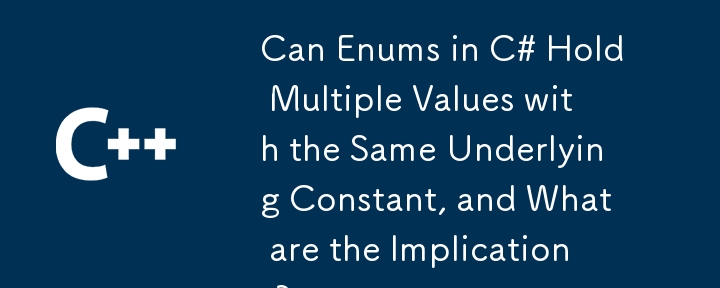

Multiple Values in Enum Declarations: A Deeper Dive into the CLR
Unlike structs, enums are categorized as lightweight value types that represent a set of named constants. However, what the question presents is an intriguing observation that enums can seemingly allow multiple values to be assigned to the same constant.
Delving into the implementation details of the Common Language Runtime (CLR), it becomes clear that enums are fundamentally similar to structs. Behind the scenes, enums derive from the System.Enum base class and are essentially structs with predefined constant values.
Consider the example enum declaration:
public enum Color
{
Red = 1,
Blue = 1,
Green = 1
}CLR internally interprets this declaration as follows:
public struct Color : System.Enum
{
public const int Red = 1;
public const int Blue = 1;
public const int Green = 1;
}While C# prohibits explicit base class declaration for structs, the CLR nonetheless generates this representation for enums.
The presence of multiple constants with the same value in an enum type does not pose a problem. However, this non-unique value assignment can result in unexpected behavior during conversion to the enum type.
For instance:
Color color1 = (Color)1; Color color2 = (Color)Enum.Parse(typeof(Color), "1");
Both color1 and color2 will be set to the Red value because the first value assignment is arbitrary. Technically, neither color1 nor color2 is assigned Red; rather, they hold the value 1. But when displayed, Red is what you'll see.
Additionally, comparison operations between non-unique enum values may yield surprising results:
// true (Red is Green??) bool b = Color.Red == Color.Green;
This equality holds true because the underlying numerical value for both Red and Green is 1.
While this behavior is not inherently problematic, it warrants consideration when employing enums with non-unique values. It is essential to determine whether this non-uniqueness aligns with the intended purpose and semantics of your enum design.
The above is the detailed content of Can Enums in C# Hold Multiple Values with the Same Underlying Constant, and What are the Implications?. For more information, please follow other related articles on the PHP Chinese website!




